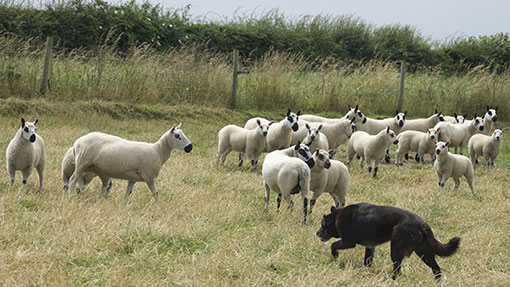Infected farm dogs costing sheep sector £15m a year

Infected farm dogs could be responsible for sheep carcass rejections, which in 2012 cost the industry an estimated £5m.
With few or no clinical signs, sheep can unknowingly host several species of canine tapeworms, causing significant economic losses to farmers through abattoir rejections, warns one vet.
“Canine tapeworm infections in sheep are a growing concern,” warns Jules Rottenbury, animal medicines adviser at Torch Farm Vets, north Devon, who has launched a scheme to help farmers tackle the problem.
“Farmers need to be aware of this, as one of the parasites, Cysticercus tenuicollis, was the most common cause of lamb liver rejection in English abattoirs in 2012, with 742,000 rejections.
“Also in 2012, another canine tapeworm, Cysticercus ovis, led to 66,500 lambs being rejected and an industry loss of £5m, which is very significant for the sector.”
Canine tapeworms
Grazing sheep are infected by ingesting tapeworm eggs that have been shed by infected dogs defecating on pastures, which can remain contaminated for up to two years. C tenuicollis spends part of its lifecycle in sheep as the intermediate host.
For more information see Torch Vets Farm Dog Worming Scheme
“The tapeworm migrates through to the liver where cysts form. This results in livers being rejected at slaughter.
“C ovis, frequently referred to as ‘sheep measles’ is less common, but has the potential to be more economically damaging for farmers with the potential for whole carcass rejections,” Mrs Rottenbury notes.
“This parasite’s lifecycle is similar, with route of transmission via dog and sheep.
However, it causes cysts to form within the muscle tissue throughout the animal, leading to condemnation of the whole carcass.”
Treatment
Neither infected dogs nor sheep usually display any clinical signs, says Mrs Rottenbury. “And once cysts have formed within the sheep, there is no treatment that will remove them.
She suggests farmers take action by eliminating these parasites with regular worming of dogs, which have access to pasture, at up to six-week intervals. This removes the tapeworms before they reach sexual maturity and produce eggs.
“As a primary course of action, using a wormer containing the active ingredient praziquantel will target all relevant species of dog tapeworm and stop their lifecycles,” she adds.
“Secondly, farmers need to ensure fallen stock is disposed of promptly so farm dogs and any visiting dogs don’t have the opportunity for scavenging and continuing the cycle.”
Mrs Rottenbury also advises managing dog access to any regularly grazed pasture. “It may be worth considering fencing off any regularly used footpaths to try and prevent contamination of grazed land.”
